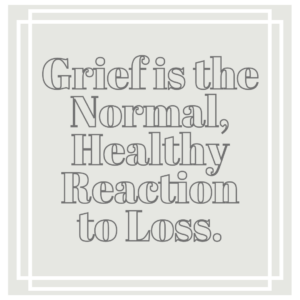Grief Facts for Grievers
Helpful Information About the Grief Process
By Allison Gary, MA, LPC
The more we know, the more we can understand. Grief can feel very isolating, lonely, and overwhelming. Grief can make us feel “crazy”, and it can feel reassuring to know that what we’re experiencing is “normal.” Here is some information about experiences that can be very typical during the grief journey, and general information that could be helpful to hear.

-
Within each individual is the natural capacity to heal.
-
The duration and intensity of grief are unique for each individual and specific to who or what they are grieving for.
-
Every individual deserves the opportunity to grieve in a supportive and understanding environment.
-
It is “normal” to feel a lot of different emotions, sometimes multiple big emotions at the same time. It can feel overwhelming and confusing to have so much internally happening as we are processing significant loss.
-
There is no right or wrong way in grief, and allowing whatever is happening emotionally to be experienced can really help along the way.
Common Grief Responses
- Mental – overwhelmed, hostile, relieved, denial, confusion, depression, self-destructive thoughts, questioning values, hopelessness, bargaining, disbelief, shock, preoccupation, avoidance, inability to focus
- Physical – exhaustion, sleep disturbances, numbness, appetite changes, nervous energy, nausea, pains or weakness, agitation, dizziness, headaches
- Emotional – anxiety, questioning, isolation, vulnerability, apathy, anger, guilt, love, resentment, loneliness, relief, fragility, heightened feelings, fear, irritability, intense sadness, helplessness, overwhelmed, shock, low self-esteem, mood swings, joy
- Behavioral – restlessness, avoiding or clinging to reminders, overactivity, searching, changes in sexual activity, crying, dreams, visiting places, disposal of belongings, need for touch, increased sensitivity, adventuring, addictions, picking up Deceased’s mannerisms
- Social – need for support, withdrawal, isolation, increased dependency, marital difficulties, hypersensitivity to topics of loss, need for rituals, role changes, role reversals
- Spiritual – dreams, despair, visions, abandonment, visitations, increase or decrease in faith, self-deprecation, forgiveness, belief in miracles, curiosity about meaning, questioning, anger towards spiritual being, feelings of isolation or estrangement, spiritual rituals, connection with sense of God/life/Big Picture
Types of Grief
- Anticipatory Grief – grief that occurs prior to the potential death or loss
- Expected Grief – a loss that is expected, where people have an opportunity to prepare for it
- Unexpected or Acute Grief – a loss that is unexpected, sudden; there can be trauma, shock or horror. Without having had time to prepare for it, denial must protect people longer
- Ambiguous Grief – grief of someone who is still alive (dementia, missing person…)
- Shadow or Anniversary Grief – grief reactions prompted by a holiday, anniversary or other dates/times/days
- Secondary Losses – grief over losses/changes resulting from the primary death/loss. Most grief is often about more than one loss.
- Complicated Grief – grief that doesn’t follow the “normal” or expected pattern due to complicating factors
- Traumatic Loss – loss that is interpreted/experienced by an individual as traumatic
- Disoriented Grief – grief experiences specific to displacement, destruction and fear following a disaster
- Disenfranchised Grief – grief occurring when the loss is not or cannot be recognized, validated, openly acknowledged, publicly mourned or socially supported
- Suffocated Grief – grief that is not only stigmatized but is punished
- Absent Grief – no external mourning/behaviors are incongruent with the loss experienced.
Secondary Losses
In addition to the loss of a significant person, there can also be grief related to the loss of:
self/identity, self-confidence, chosen lifestyle, security/stability/income, sense of safety, known family structure, sense of belonging, familiar manner of relating to others, the past, the future, direction/routine, dreams, trust, sharing with them, the ability to focus, ability to see choices/make decisions, hobbies that used to be enjoyable, sense of humor, health, inner happiness and joy, patience with self and/or others, faith…
Consider for you what secondary losses you are also grieving right now.
Styles of Mourning
It can feel very lonely when others aren’t grieving the same as we are. When we observe that we are “different”, it can cause concern that something is “wrong” with us. Truthfully it may be that others simply have a different processing style.
- Instrumental Grievers tend to “do” things – they handle practical matters and focus on problem solving.
- Intuitive Grievers tend to “feel” things – they focus on experiencing and expressing emotion.
Many people will grieve using a combination of intuitive and instrumental styles.
For the printable version of this article, click here!
